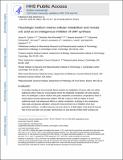Physiologic Medium Rewires Cellular Metabolism and Reveals Uric Acid as an Endogenous Inhibitor of UMP Synthase
Author(s)
Cantor, Jason R.; Abu-Remaileh, Monther; Kanarek, Naama; Freinkman, Elizaveta; Gao, Xin; Louissaint, Abner; Lewis, Caroline A.; Sabatini, David; ... Show more Show less
Downloadnihms861963.pdf (2.907Mb)
PUBLISHER_CC
Publisher with Creative Commons License
Creative Commons Attribution
Terms of use
Metadata
Show full item recordAbstract
A complex interplay of environmental factors impacts the metabolism of human cells, but neither traditional culture media nor mouse plasma mimic the metabolite composition of human plasma. Here, we developed a culture medium with polar metabolite concentrations comparable to those of human plasma (human plasma-like medium [HPLM]). Culture in HPLM, relative to that in traditional media, had widespread effects on cellular metabolism, including on the metabolome, redox state, and glucose utilization. Among the most prominent was an inhibition of de novo pyrimidine synthesis—an effect traced to uric acid, which is 10-fold higher in the blood of humans than of mice and other non-primates. We find that uric acid directly inhibits uridine monophosphate synthase (UMPS) and consequently reduces the sensitivity of cancer cells to the chemotherapeutic agent 5-fluorouracil. Thus, media that better recapitulates the composition of human plasma reveals unforeseen metabolic wiring and regulation, suggesting that HPLM should be of broad utility.
Date issued
2017-04Department
Massachusetts Institute of Technology. Department of Biology; Koch Institute for Integrative Cancer Research at MITJournal
Cell
Publisher
Elsevier
Citation
Cantor, Jason R. et al. “Physiologic Medium Rewires Cellular Metabolism and Reveals Uric Acid as an Endogenous Inhibitor of UMP Synthase.” Cell 169, 2 (April 2017): 258–272 © 2017 Elsevier Inc
Version: Author's final manuscript
ISSN
0092-8674
1097-4172